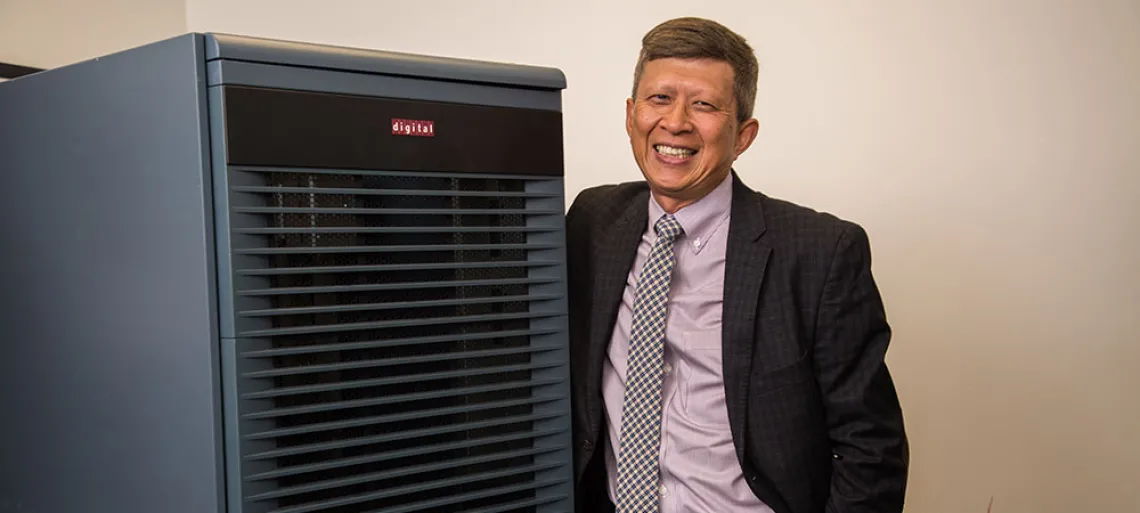Why Does Hsinchun Chen Have Your Data?
A Career in Artificial Intelligence

Hsinchun Chen might have your credit card data.
He’s probably had it for years—so if nothing’s happened with it yet, you’re probably safe.
What’s he doing with it? He’s trying to understand the way hackers and cyberterrorists work so that—someday—it’s far harder for them to get your credit card data.
That’s why his Artificial Intelligence Laboratory in the Eller College is full of Barbie dolls, voting booths, insulin ports, lightbulbs—anything that can be internet enabled and used to gather information about you.
In fact, for the entirety of Chen’s career, he has been working with large amounts of data to understand the ways of criminals, terrorists—even diseases.
“Curiosity is my driver,” he says. “Especially curiosity of the unknown.”
Early on, he was also influenced by Herbert Simon, the founding father of AI, who’s seminal book Human Problem Solving hit Chen at the right time. He went on to earn his management science degree at National Chiao-Tung University in Taiwan before moving to University of Buffalo for his MBA in the 1980s.
Shortly thereafter: “I became interested in high impact applications of data and technology,” says Chen. “I’m not interested in creating simple apps—those fulfill certain basic social functions. Instead, I want to use data and technology for large social solutions.”
Chen’s interests led to his PhD dissertation at New York University on online information retrieval systems and eventually became the foundation for a pivotal project he took on with the Tucson Police Department. Using information from multiple police databases, Chen was able to start identifying associations among crimes, which helped the police department link suspects to crimes and subsequently apprehend them. The information could also be shared across jurisdictions and, as a result, proved so useful that soon other police departments were lining up to license it. Chicago, Phoenix, San Diego—some 5,000 departments in all 50 states and in 28 NATO countries eventually signed on. Called COPLINK, the company Chen founded merged with another major security analytics company and was then sold to IBM in 2011, one of the largest UA spin-off successes.
Chen went on to have success with other ventures—“I’ve folded more companies than I can count,” he says—but he’s quick to point out that none of his success is accidental. “Commercialization requires a lot of effort,” he says. “A lot of work goes into determining if something I am researching can be brought to market and be useful in the real world.”
Chen expanded his research to other sectors beyond law enforcement—to sport analytics, to counter-terrorism and to healthcare. One of his current projects is called Silverlink—a mobile health sensor-based system that, through analyzing millions of mobile records a week, can predict falls based on a patient’s past walking and living patterns. Chen designed this for his mother, who lives 5,000 miles away in Taiwan, where, as the oldest of son of five siblings, he first became interested in information technology.
“I was always competitive,” he recalls. “I was always in the top five in my class, and I was the first person in my family to earn an advanced degree.”
He was even the first in his PhD class in economics at NYU—despite not being an economics major.
This aspiration drove him to create the first AI Lab in a business school—almost 30 years ago, before AI was on the tip of everyone’s tongue. With more than $40M federal funding, Eller’s AI Lab is still the only one in the United States housed in a business school.
“AI is behind everything I do,” says Chen—and he’s built a notable career on it. His seminal book Dark Web (the first academic book to explore the dark side of the Web) came out in 2012 and he has published more than 500 academic articles in the management information systems field. He remains one of the most published and cited MIS scholars in the world.
Given this deep knowledge, what does the Father of Security Informatics think about the ubiquity of AI today?
“Autonomous vehicles, virtual games, e-commerce applications—these will all do very well,” he says. “But that’s only about 20 percent of possible applications. The other 80 percent still does not have enough data—and yet there will be more data than ever before. And when technology meets data—the world will become very different.”
So, short-term, keep an eye on your credit card…and voting booths and Barbie dolls, because you never know what or who could be listening. “Once a machine can do it better than a human, it’s no longer AI,” says Chen. “AI is always the next frontier!”

